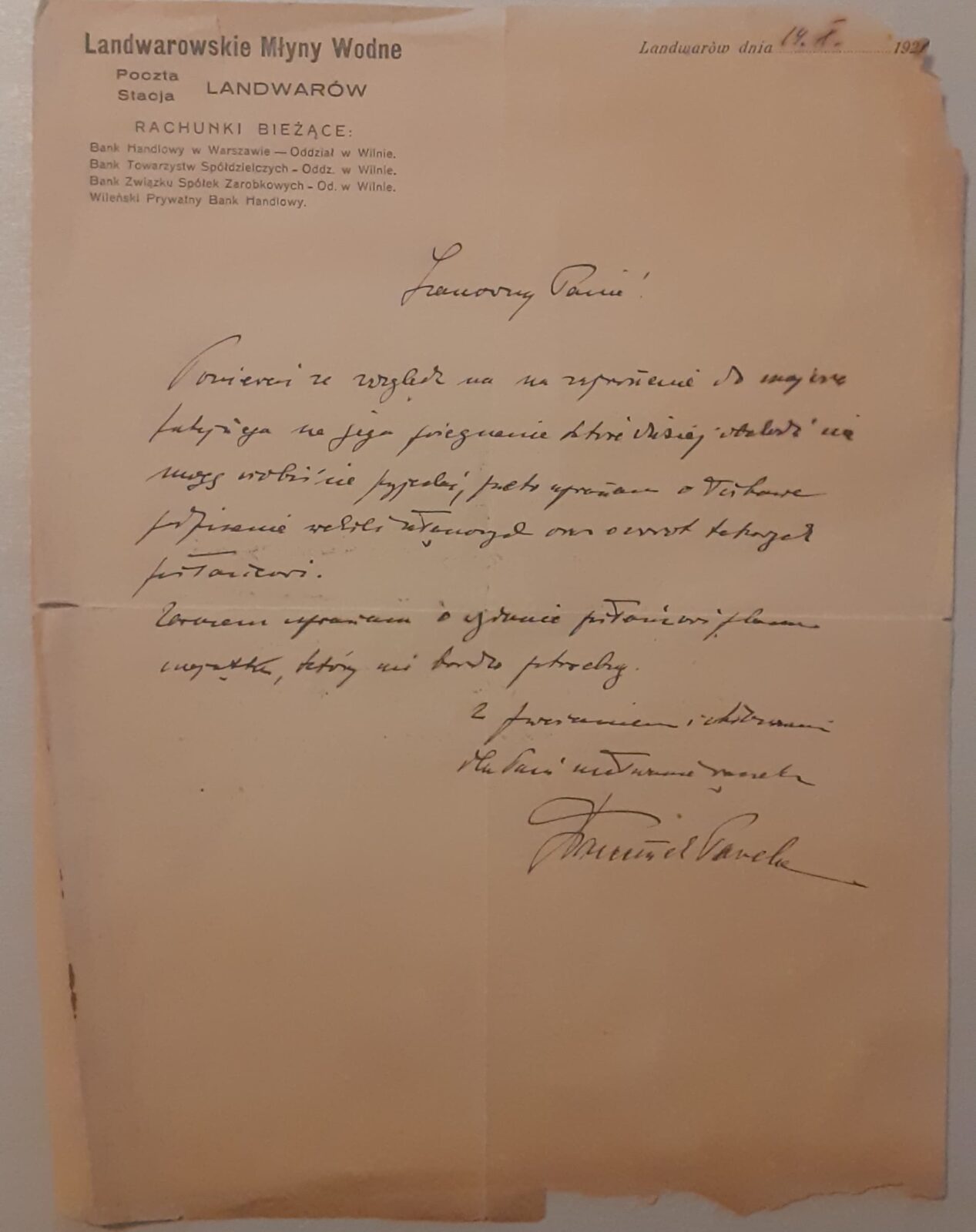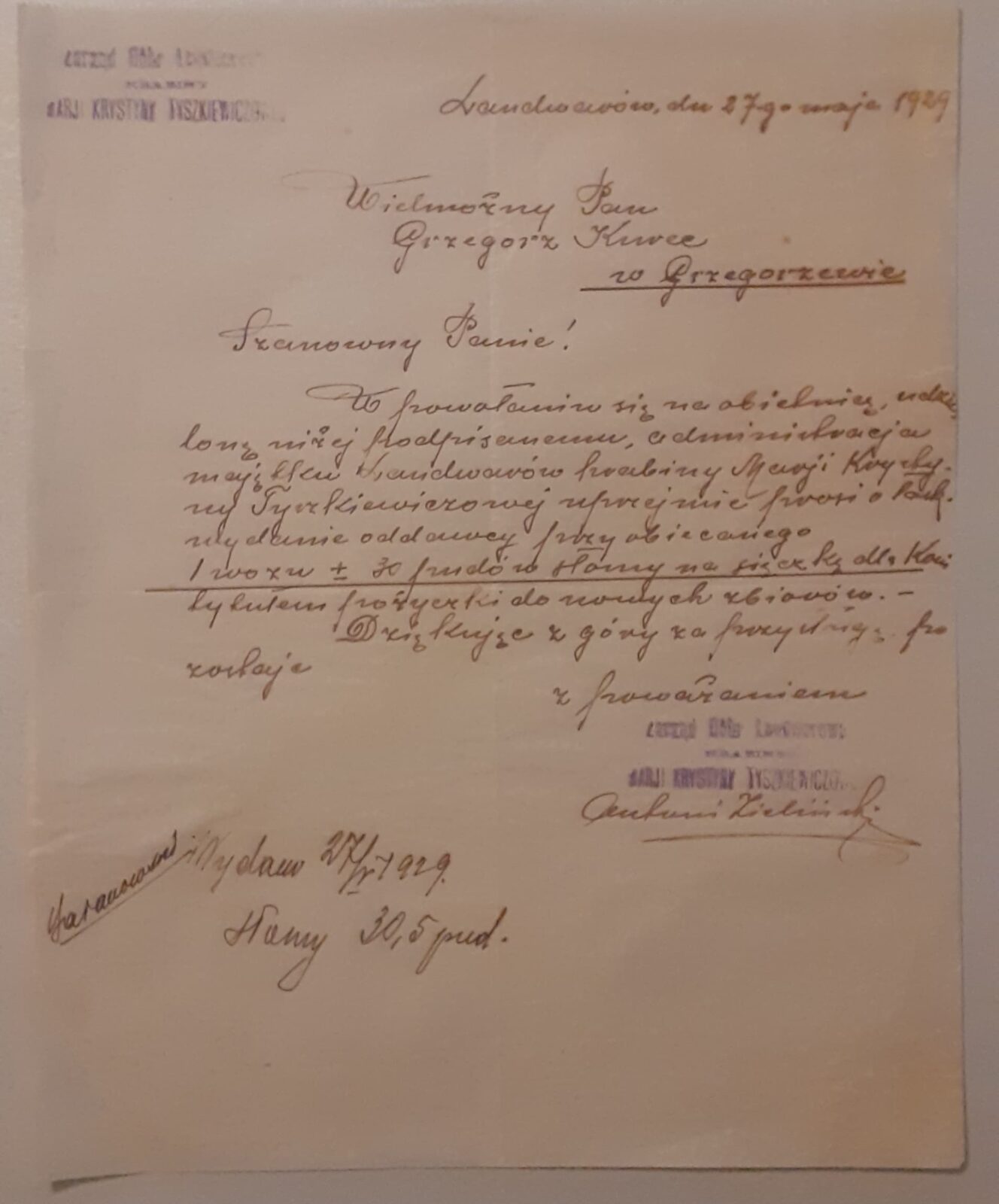Owning a manor 100–150 years ago signified a certain status. However, it also inevitably came with obligations, particularly financial ones. The Lentvaris Manor was no exception: maintaining it required substantial funds and financial acumen. Lacking the latter, Count Vladislovas Tiškevičius hired experienced managers and stewards. Unfortunately, certain historical circumstances and the appointment of unsuitable individuals led to significant difficulties for the Lentvaris Manor. Documents preserved in Adomas Milius’s collection bear witness to these challenges.
The decline of the Lentvaris Manor began during World War I. The manor’s palace, sewage system, electricity, and water supply were destroyed or damaged during the war. Fearing another conflict, the counts decided not to invest in restoring the palace. Another blow came with the 1921 Treaty of Riga, which divided the manor’s estates between two countries. However, the war’s consequences were not the only issue for the Tiškevičius family. At that time, it was revealed that the manager of their estates near Vilnius, Pavelas, had been embezzling the manor’s resources for his own purposes. Failure to invest in livestock breeding, neglect of agricultural development, and illegal logging became decisive factors in the manor’s downfall.
Hints of these issues can be seen in a 1921 document, which mentions promissory notes and a request for the manor’s plan. At that time, the manor plan was an important document, so it is likely that the letter’s author was addressing the manor’s owners directly. It is believed that after the scandalous dismissal and escape of the manager Pavelas, no new manager was hired for the Vilnius estates, likely due to fears of a similar scenario. The plan may have been needed by another high-ranking noble to review the lands after the Treaty of Riga. Meanwhile, promissory notes had become a common practice for purchasing items on credit. The number of such notes kept increasing, while the ability to pay them off diminished.

Lentvaris, 1921
Lentvaris Water Mills
Post Office
Station LENTVARISCURRENT ACCOUNTS:
Warsaw Commercial Bank – Vilnius Branch
Cooperative Societies Bank – Vilnius Branch
Union of Business Companies Bank – Vilnius Branch
Vilnius Private Commercial BankDear Sir,
Since I am unable to personally attend the invitation to visit the local manor today to bid it farewell, I kindly request you to sign the enclosed promissory notes and return them to the messenger.
At the same time, I ask you to provide the messenger with the manor plan, which I urgently need.With respectful bows and
kissing the Lady’s hands,
Let me know if you need further assistance!
Nevertheless, the manor continued to function for a few years, retaining its core staff. But everything had changed. In 1925, Count Vladislovas’s son Eugenijus held his wedding. There were neither funds nor suitable premises for the event, so the wedding was celebrated at the related Radvila family’s estate. The Tiškevičius family itself no longer lived in the palace but in auxiliary buildings. Luxury was gone, yet they were reluctant to abandon their homeland.
The final years of the manor’s decline are considered to be 1929. A surviving document from that year shows a request for 500 kilograms of fodder for horses, sought as a loan from neighboring Grigiškės. Marija Kristina Tiškevičienė always kept horses at Lentvaris. In May, as the grazing season began, this amount of fodder would have been sufficient for one horse for a good month, but it is likely that more horses remained at Lentvaris.

Stamp:
COUNTESS
MARIJA KRISTINA TIŠKEVIČIENĖ
Lentvaris, May 27, 1929Dear Sir,
Based on the promise given to the undersigned, the administration of Countess Marija Kristina Tiškevičienė’s manor kindly requests you to provide the bearer with the promised 1 cart ± 30 poods of straw for horse fodder as a loan until the /illegible/ harvest.
With gratitude in advance for your kindness,
Respectfully,Stamp:
COUNTESS
MARIJA KRISTINA TIŠKEVIČIENĖ
Issued on 1929-05-27.
Straw: 30.5 poods.Let me know if you need further assistance!
Ultimately, in the same year, Count Vladislovas and his wife Marija Kristina decided to move to Warsaw. Their son Eugenijus moved to Lentvaris, though it is unclear whether he fulfilled Marija Kristina’s debt obligations. However, being somewhat more prudent than his father, on July 17, 1929, Eugenijus purchased the Karpiškiai estate for $18,500, covering an area of 91.47 dessiatins. This allowed the remaining Lentvaris Manor to survive until World War II.
The surviving documents testify that even during the greatest hardships, life at the Lentvaris Manor continued, and the counts were reluctant to let go of their employees. However, after World War I, the Tiškevičius family lived beyond their means and survived only with the help of neighboring estates.




